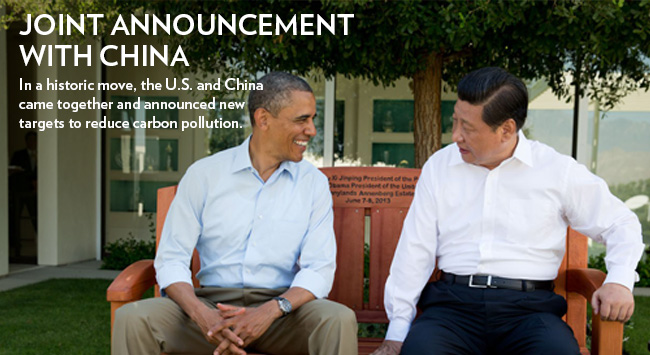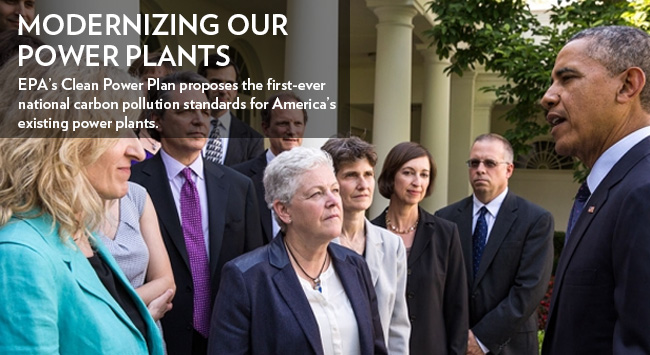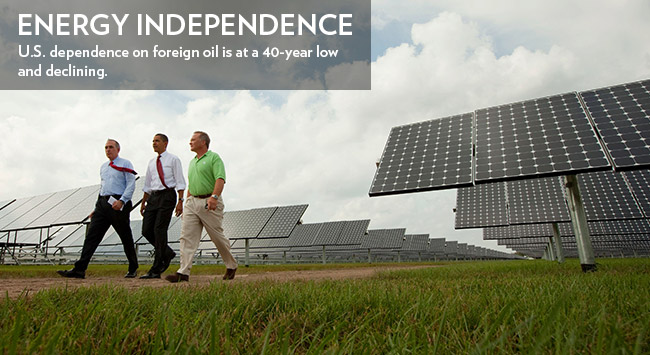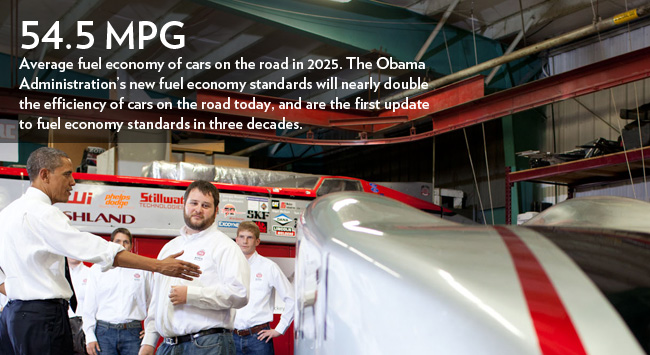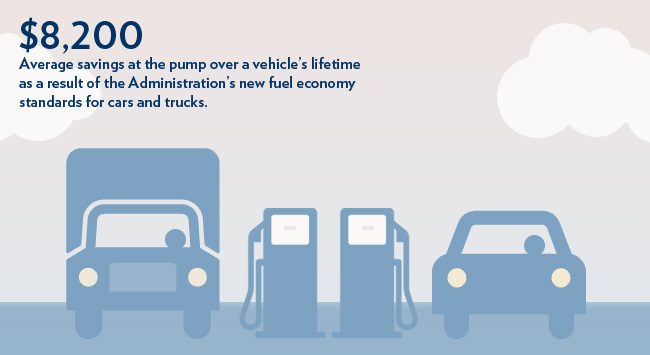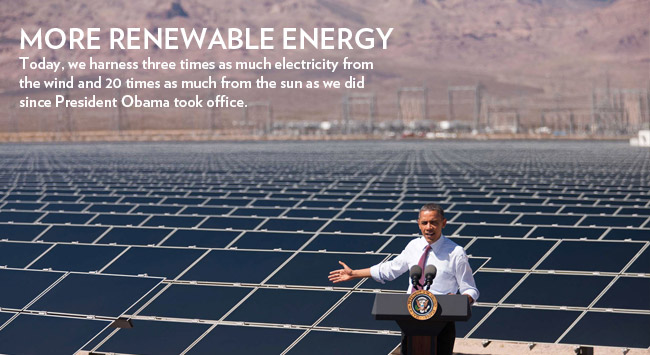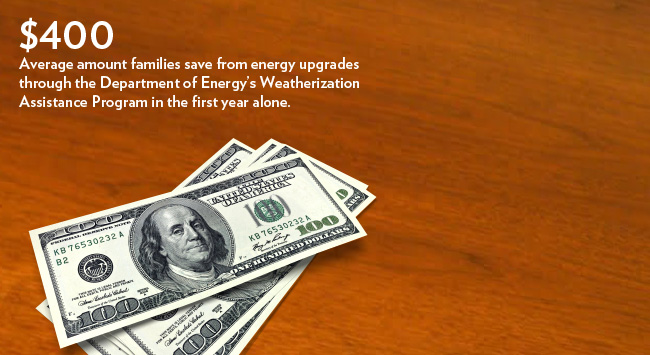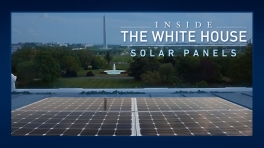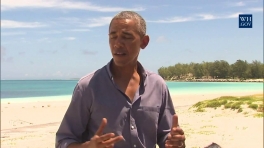Our Environment
The Obama administration is committed to protecting the air we breathe, the water we drink, and the land that supports and sustains us. From restoring ecosystems in the Chesapeake Bay and the Everglades, to protecting the treasured spaces that matter most to Americans, we are bringing together federal agencies to tackle America’s greatest environmental challenges.

Supporting Land and Water Conservation

The President established the America’s Great Outdoors Initiative to foster a 21st century approach to conservation that responds to priorities of the American people. When he signed the Omnibus Public Land Management Act of 2009, President Obama marked the most extensive expansion of land and water conservation in more than a generation, designating more than 2 million acres of federal wilderness, thousands of miles of trails, and protecting more than 1,000 miles of rivers. In addition, the President has used his authority under the Antiquities Act 13 times to permanently preserve some of America’s most treasured landscapes and waters, most recently designating the San Gabriel Mountains National Monument in Los Angeles County, one of the most disadvantaged counties in the country when it comes to access to parks and open space for minorities and children.
Wilderness, parks, forests, monuments, and other public lands help support local economies through tourism and recreation. According to industry reports, outdoor recreation supports 6.1 million jobs nationwide. Recent estimates also show that visits to public lands and waters added more than $50 billion to the economy in 2012 alone. Protected public lands also attract businesses interested in relocating to areas with beautiful scenery, outdoor opportunities, and a high quality of life. These businesses can bring high-paying jobs that cannot be outsourced, which helps explain why, on average, western non-metro counties’ per capita income increases when there is more protected public land in the area. The outdoor recreation industry supports 6.1 million jobs nationwide.
Protecting Our Oceans
America's oceans and coastal regions support tens of millions of jobs and contribute trillions of dollars a year to the national economy. But the health of our oceans is under threat on multiple fronts, from overfishing to carbon pollution. Illegal, unreported, and unregulated (IUU) fishing and seafood fraud undermines the economic and environmental sustainability of fisheries and fish stocks, and ocean acidification threatens to alter the very nature of the ocean food web.
In response to these challenges, President Obama has established the first comprehensive National Policy for the Stewardship of the Ocean, our Coasts, and the Great Lakes. The National Ocean Policy helps us prioritize our efforts and resources to address the most critical issues facing our oceans and establishes a comprehensive, collaborative, regionally based planning process to ensure healthy ocean and coastal resources for the many communities and economies that rely on and enjoy them. In keeping with these goals, the President has taken action to develop a comprehensive program to combat IUU fishing and support fishermen and, in September 2014, created the largest marine monument in the world completely off-limits to development. The President’s National Ocean Policy has helped establish the U.S. as a global leader in sustainable seafood and effective management of our ocean resources, and enforcement of fishery rules that have supported near-record highs in landings and revenue for our domestic fishing industry.
Explore The National Oceans Policy
Prioritizing Clean Water
The Administration is taking comprehensive action to ensure the integrity of the waters Americans rely on every day for drinking, swimming, and fishing, and that support farming, recreation, tourism, and economic growth. We have proposed a rule clarifying Clean Water Act protections for important waters; launched innovative partnerships and programs to improve water quality and water efficiency; and created initiatives to revitalize communities and economies by restoring rivers and critical watersheds. The Administration is also modernizing the guidelines that govern federal water resource investment, calling for water resources projects based on sound science, improved transparency, and giving voice to local communities.
Ensuring Clean Air
The Administration is committed to defending every American’s right to breathe clean air and has taken significant steps to protect the health of American families and save lives by cleaning up air pollution in communities across the country. We have established first-ever national limits for mercury, arsenic, and other toxic air pollution from power plants; taken common-sense steps to limit mercury and other pollutants from the largest sources of industrial air pollution, including cement plants, industrial boilers, and waste incinerators; put in place new standards to reduce air pollution from passenger cars and trucks; and proposed new ozone standards that will deliver three dollars in health benefits for every dollar spent. These actions are a major victory for public health. With these protections in place, we are preventing tens of thousands of premature deaths, reducing heart attacks and hospital visits, alleviating hundreds of thousands of child asthma attacks, and preventing millions of lost school and work days.
Restoring Our Treasured Great Ecosystems
The Administration is successfully restoring priority ecosystems across the United States, working with a variety of stakeholders on collaborative efforts that strengthen natural resources for communities.
Working Toward Environmental Justice

Because we all deserve the chance to live, learn, and work in healthy communities, the Obama administration is committed to ensuring that communities overburdened by pollution – particularly minority, low-income and indigenous communities – have the opportunity to enjoy the health and economic benefits of a clean environment. After more than a decade of inaction, the Administration reconvened the Environmental Justice Interagency Working Group and engaged more than 100 environmental justice leaders at a White House forum. Federal agencies signed a Memorandum of Understanding formally committing to environmental justice, and have since taken steps to integrate environmental justice into federal decision-making and programs in areas such as transportation, labor, health services, housing and others.
